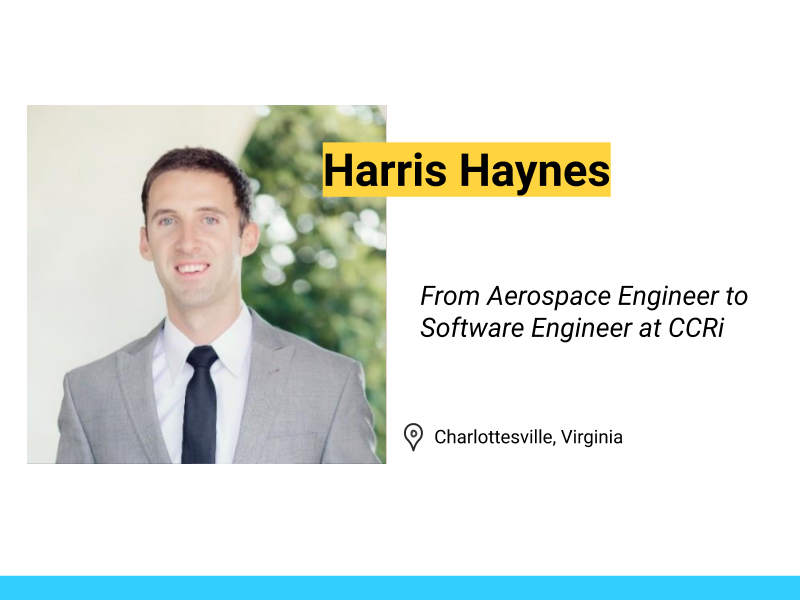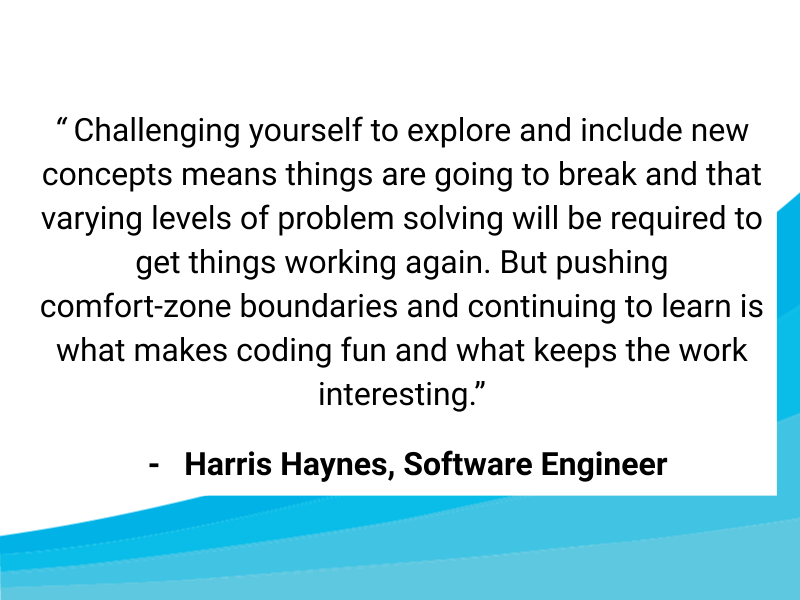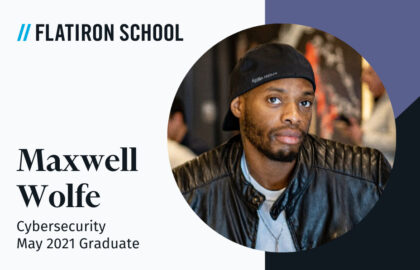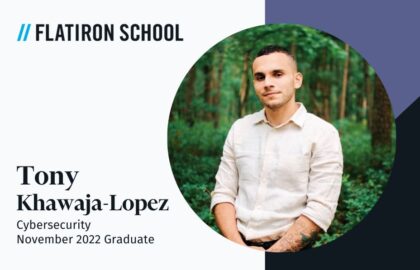
“The future of space exploration will certainly depend on software engineers and developers as much as aerospace engineers and research scientists.”
Harris Haynes, aerospace engineer and recent Flatiron School graduate, on the time and space it took for him to learn to code, with some universal networking advice.
Amid your extraordinary career in the aerospace sector, what sparked the desire to learn to code?
Coding has actually been a supplemental part of my work since undergrad, although typically in the form of data analysis. My first taste of coding was an astronomy course that used satellite observations to map sources of X-ray emission in other galaxies. Upon seeing how powerful even the simplest coding concepts and applications could be, I knew writing and working with code was something I wanted to do. As an aerospace engineer I’ve written code to process all types of wind tunnel data including fluid velocity measurements in exhaust jets of F/A-18s as well as surface pressure fluctuations on SpaceX launch vehicles during ascent. These experiences certainly fueled my desire to complete the online software engineering bootcamp and learn a host of new programming languages, concepts, and skills geared towards full-stack development.
How has the Flatiron School's approach to learning been different than your other educational experiences?
All of my previous academic experiences have been the standard in-person, on-campus learning environments. Thus participating in a self-paced, online program was very different for me but necessary given my current situation (i.e., cross-country move, family with a little one, etc.). I found the flexibility of the online program to be extremely beneficial. Not being tied to a set schedule or time constraint really allowed me to get the most out of the program since I could adjust my pace as needed to learn material without feeling rushed or held back. Additionally, I was able to spend significant time on the portfolio projects to incorporate features beyond the minimum requirements and really solidify core concepts. Despite being an online program, I definitely received the personal experience I was looking for through one-on-one project reviews as well as meetings with technical and career coaches.

Has anything surprised you about the process of learning to code?
One aspect that continues to amaze me is how much learning to code is really about dealing with failure… in the form of error messages. From pure data analysis to building complex Rails apps, gaining experience through trial-and-error, building, breaking, and refactoring is one of the best ways to master coding. Challenging yourself to explore and include new concepts means things are going to break and that varying levels of problem solving will be required to get things working again. But pushing comfort-zone boundaries and continuing to learn is what makes coding fun and what keeps the work interesting.
What are you excited to use your new skills to build in the future?
More than any one project, I’m excited to grow and progress as a developer after landing my first job. Instead of focusing on a specific company or industry right now, I’m actually remaining flexible in hopes of finding a position where I’ll get significant hands-on experience and the chance to wear a variety of hats. However, down the road, in a perfect world, I would love the opportunity to combine my aerospace background and more recent Flatiron School experiences to carve out a niche in space exploration.
Can learning to code at Flatiron School potentially help future space exploration? If so, how?
Absolutely. If there’s anything I learned at SpaceX it’s that we’re only scratching the surface of what’s to come with space exploration. From launching Elon Musk’s car into orbit to making the landing and reuse of rockets seem routine, it’s an exciting time to be in the space launch industry — not to mention the incredible work being done by others such as Blue Origin and Virgin Galactic regarding suborbital spaceflight and tourism. Given how valuable coding and problem-solving skills are across seemingly all industries now, the future of space exploration will certainly depend on software engineers and developers as much as aerospace engineers and research scientists. Plus there will always be a need for new apps like Google SpaceMaps and Marsbnb.
You’ve been actively networking lately – how has that been going, and what have you learned that might be helpful to other Flatiron School grads?
I have been actively networking for the past few weeks and have found it to be incredibly helpful as I begin the job search. Because I’m new to the area of Charlottesville, meeting with others informally to learn about different companies, job openings, work environments, etc. has been invaluable. Something I’ve noticed that may be useful to others is how important it is to meet with contacts in person as opposed to solely relying on email or LinkedIn. Without question the best advice and help I’ve received so far has come from meetings with persons I’ve reached out to simply by asking to grab coffee and hear about work. What’s more, these contacts are much more likely to introduce you to others and provide recommendations when the 15-30 minute coffee break no longer makes you a stranger.
Reflecting back on your Flatiron School experience so far, what advice would you offer to new or prospective students?
While we all wish learning to code could happen overnight or at least as quickly as reading a manual, the fact is that most coding concepts take time to sink in even with lots of practice. It may be tempting to rush through the curriculum, but a rapid pace will only provide exposure to key concepts — not an understanding and certainly not mastery. Nevertheless for those wishing to complete the program quickly, my advice would be to at least spend time on the portfolio projects by selecting topics that are interesting/important to you and delving deeply into a variety of coding concepts, not just the requirements. Meaningful topics will provide the much-needed motivation to get through inevitable stick-points. Lastly when you think you’ve finished, spend a few extra days cleaning up your app by testing, refactoring, and commenting code. Try breaking your app with bad URLs, erroneous form inputs, etc. and write code to guard against such issues. This practice will train you to think like a well-rounded programmer, and adding comments will reinforce what you’ve done and learned by forcing you to summarize it for others.
What’s next for you?
There are several start-ups that I currently have my eyes on, so fingers crossed all goes well over the next several weeks! In the meantime I’m planning to continue learning, coding, and networking.
Harris’ career coach Beth Wilkinson offers her perspective on why she’s enjoying working with him:
“Harris' success lies in his self awareness, perseverance, ownership, and personal accountability for his Flatiron School experience. As his career coach, I truly appreciate that he embraces, leverages, and completes all Flatiron School recommended career tools and resources to enhance and advance his job search. Harris and I have had multiple conversations around the importance of networking and his willingness and ability to connect in person with others has been an integral part of his effective networking strategy. It is an absolute pleasure and honor to work with Harris and I am excited to see what the future holds for him!”




